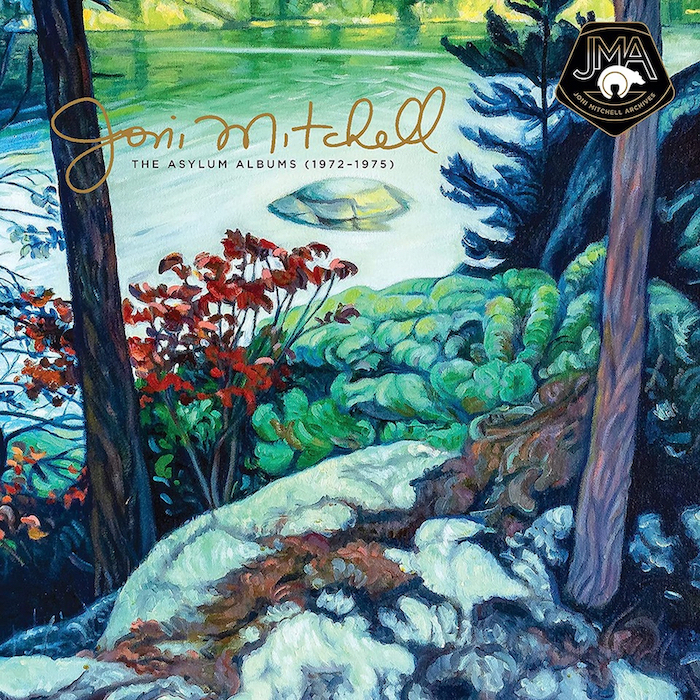Because of her health problems, Joni Mitchell hasn’t issued any newly recorded material since 2007’s Shine, but that doesn’t mean nothing has been released since then. On the contrary, in just the last couple of years, we’ve witnessed the appearance of a flood of CDs. Archives, Vol. 1: The Early Years delivered five discs’ worth of previously unavailable recordings from 1963 through 1967 while Archives, Vol. 2: The Reprise Years offered another five CDs of unheard music, in this case from 1968 through 1971. Last year also brought The Reprise Albums (1968–1971), a box that contained remastered versions of Mitchell’s first four albums.
And now we have The Asylum Albums (1972–1975), which features a cover painting by Mitchell and comes with a note of appreciation from Neil Young. The box collects remastered copies of three studio LPs – For the Roses, Court and Spark, and The Hissing of Summer Lawns – plus a live set called Miles of Aisles. Like The Reprise Albums, this latest collection embraces no bonus tracks (understandable, since those are being saved for the ongoing Archives series), so you can’t call it revelatory – except perhaps for anyone who has somehow managed to not hear this music until now. Still, this anthology is loaded with classic material. If you’re missing more than one or two of its four albums – or you own scratchy old vinyl copies – it offers plenty of reasons to open your wallet.
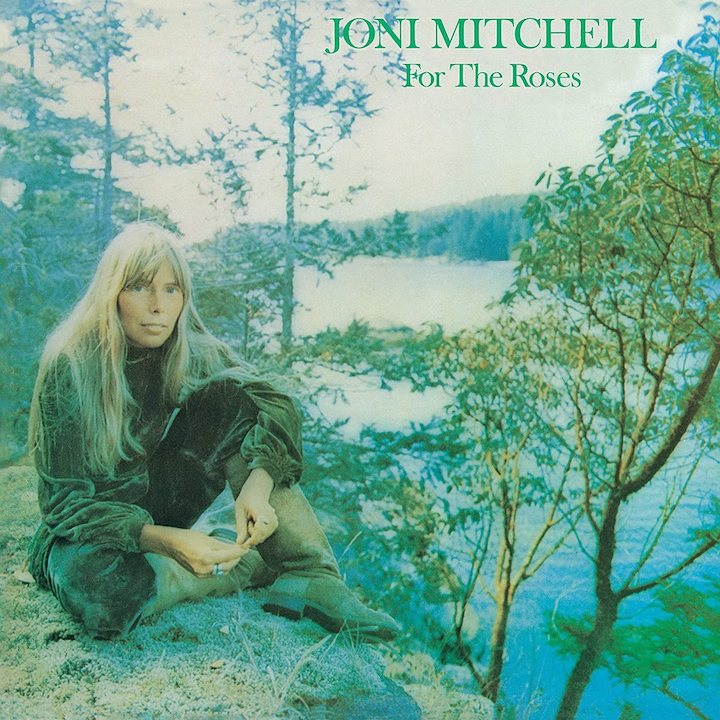
While The Reprise Albums showcased a hugely talented new folksinger coming into her own, The Asylum Albums finds Mitchell stretching beyond the bounds of traditional folk with equally impressive results. For the Roses, the oldest LP in this box set, does include a few songs that could have fit on earlier records, such as the lovely title cut. But most of the numbers on this 1972 release – which even incorporates a few sax solos – make clear that Mitchell is not the sort of artist who’s content to deliver variations on past successes.
“Let the Wind Carry Me,” which emphasizes piano and brass instruments, is heavily jazz influenced as is “Barangrill.” The lyrically deft “You Turn Me On, I’m a Radio,” which features harmonica by then-boyfriend Graham Nash, is a lush, sophisticated pop production with no parallel in the earlier LPs. Another highlight is “Cold Blue Steel and Sweet Fire,” a jazzy number that finds Mitchell’s vocal work reaching new levels of sophistication.
Court and Spark, which arrived in 1974, continues the preoccupation with romantic subjects that had been front and center for Mitchell at least since 1971’s Blue, but this album takes her further into jazz-influenced, orchestrated pop than even listeners to For the Roses could have anticipated. At times, the instrumentation and Richard Perry’s production sound a bit dated but Mitchell’s intimate lyrics and nuanced vocals never disappoint.
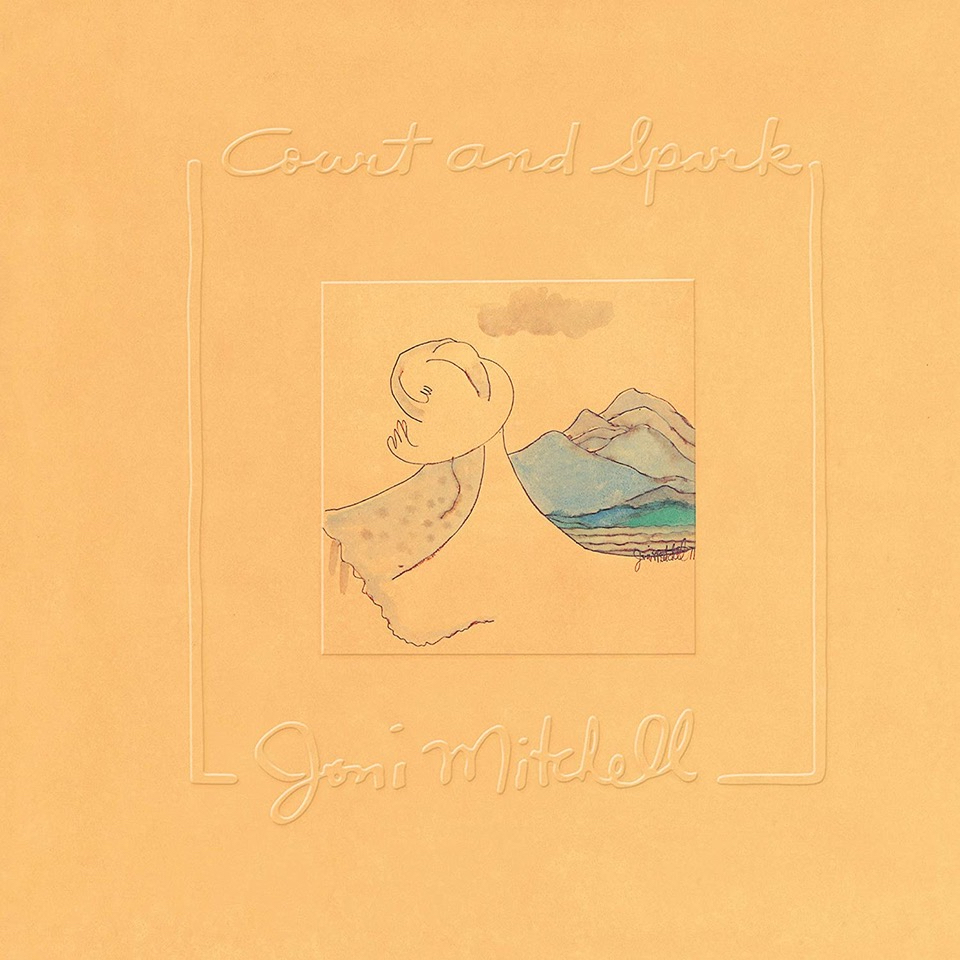
Highpoints include the passionate “Help Me,” which delivered a Top 10 hit; the atmospheric “Free Man in Paris,” which features backing vocals by Nash and David Crosby; and “Raised on Robbery,” a brassy rock excursion with the Band’s Robbie Robertson guesting on guitar. Mitchell ends this otherwise meditative, all-originals collection with a lighthearted, beautifully sung cover of “Twisted,” the 1952 vocalese jazz tune by Annie Ross and Wardell Gray.
Next up is Miles of Aisles, a 1974 live set drawn from three concerts performed earlier that year at three California venues. The 18-track album, which originally appeared on two vinyl LPs, features backup by the L.A. Express, a jazz fusion group that also contributed to a few Court and Spark tracks.
At this point, Mitchell has six studio albums and so much great material to her credit that she can deliver a satisfying 78-minute concert without even hitting all the high points of her songbook. She does manage to fit in one tune each from her first two albums, Song to a Seagull and Clouds (“Cactus Tree” and “Both Sides Now,” respectively) as well as four each from Ladies of the Canyon (“Rainy Day House,” “Big Yellow Taxi,” “Woodstock,” “The Circle Game”) and Blue (“All I Want,” “Carey,” “Blue,” “The Last Time I Saw Richard”). For the Roses is represented by “Cold Blue,” “You Turn Me On, I’m a Radio,” and “Woman of Heart and Mind.” Curiously, given that these concerts were part of a tour designed to promote the then-new Court and Spark, the set includes only one number from that album (“People’s Parties”).
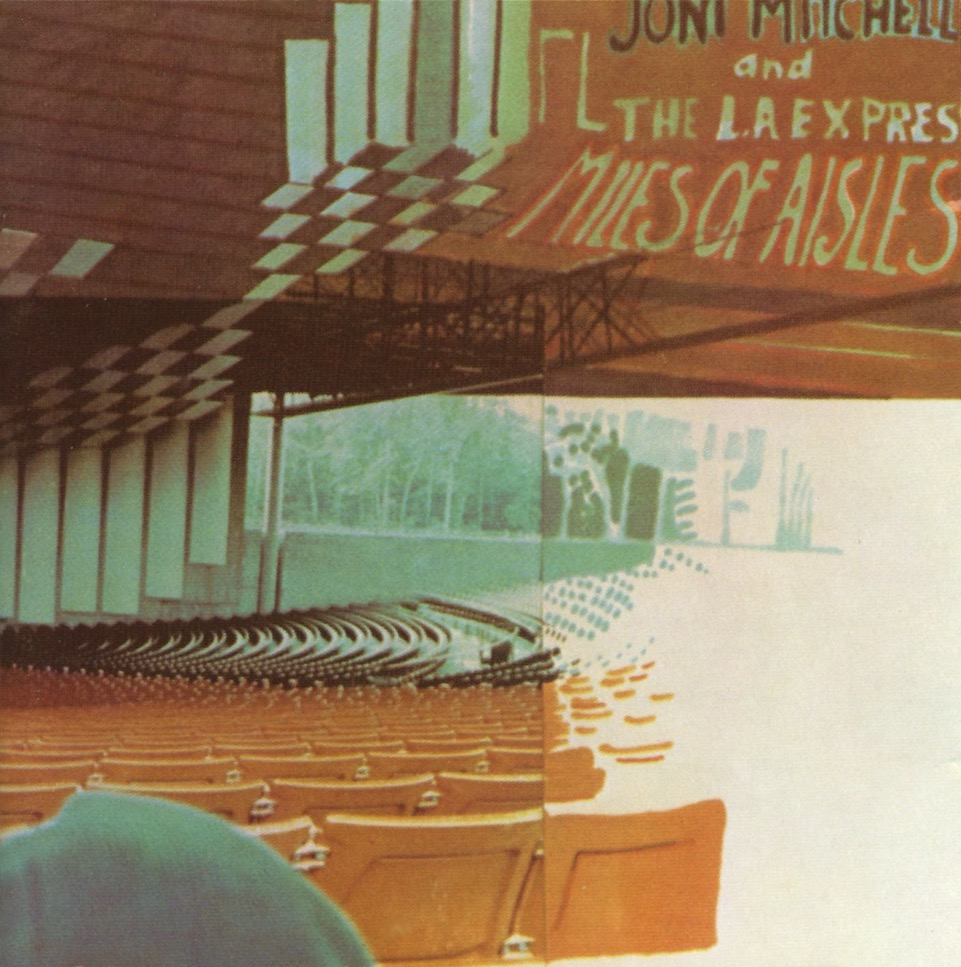
Note that a previous CD version of Miles of Aisles reportedly cut about seven minutes of onstage chatter that appears on the original LPs. Though the new release fits everything onto one disc, it restores the missing material, so you get to hear, for example, Mitchell’s joking explanation of one difference between performing artists and painters: “Nobody ever said to Van Gogh, ‘Paint A Starry Night again, man!’”
The program’s sequencing doesn’t make it easy to follow her artistic growth, but the concert is consistently well performed and offers a satisfying sampler of Mitchell’s catalog. The album was a commercial success, reaching No. 2 on the charts, and even produced a minor hit single – a live version of Ladies of the Canyon’s “Big Yellow Taxi.”
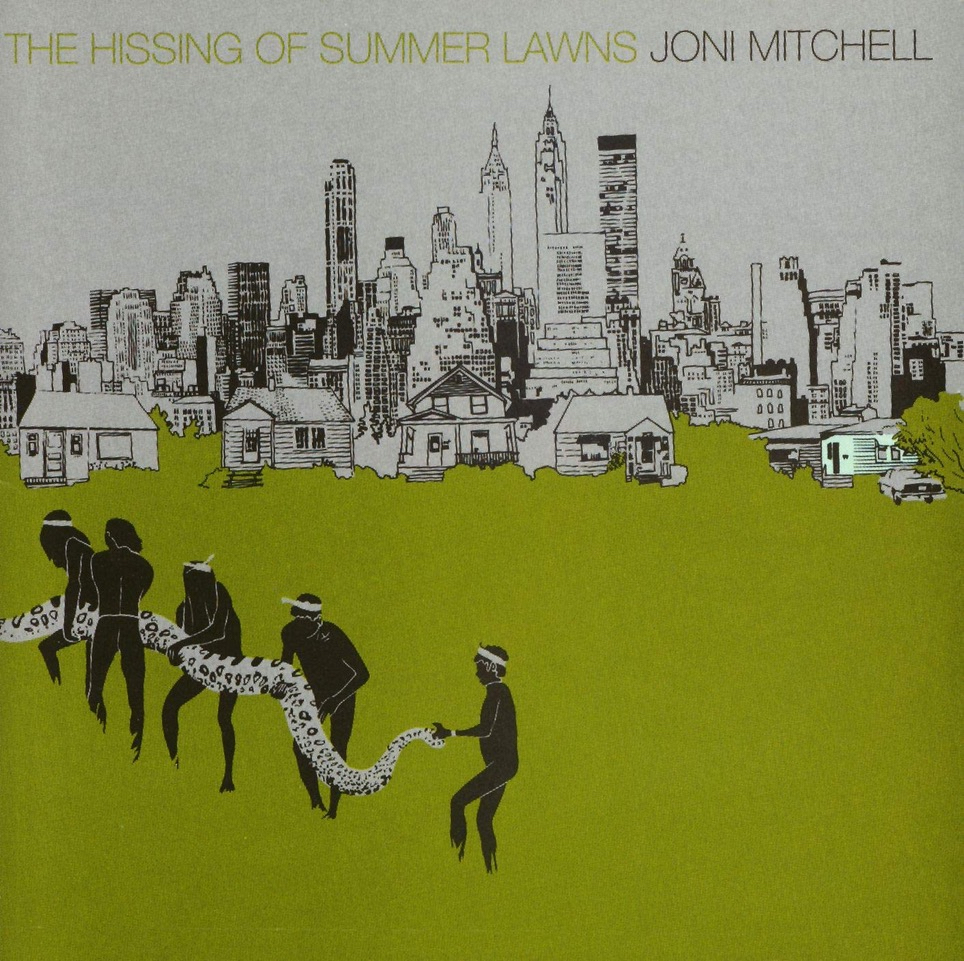
The last album in this box – 1975’s The Hissing of Summer Lawns, which like its predecessor features the L.A. Express – didn’t do as well as that earlier LP, either commercially or with the critics. In retrospect, the lukewarm response seems both understandable and wrong. The record finds Mitchell moving even further away from her folk roots, with more complex rhythms, unexpected instrumentation (African drums open “The Jungle Line”), relatively inaccessible lyrics, and complex jazz-inflected arrangements. The album has stood the test of time, though. It still sounds challenging but is perhaps easier to appreciate once you’ve adjusted your expectations and become more familiar with Mitchell’s new musical turf.
She has had quite a career, and The Asylum Albums is one chapter that no fan should miss.
Also Noteworthy
Mel Carter, When a Boy Falls in Love. According to You Send Me, Daniel Wolff’s Sam Cooke biography, the singer initially intended to give “When a Boy Falls in Love” (which he co-wrote) to Pat Boone. “But neither Boone nor others who tried could make the song work,” Wolff reported. Then Cooke reconnected with Mel Carter, a silky-voiced young gospel singer he’d known in the late fifties. Cooke signed him to a record contract, helped him perfect a version of the number, and proclaimed: “Melvin, you got the best pair of pipes in the world.”
Carter’s not that good, but Cooke’s enthusiasm is understandable. His protégé – who would have a Top 10 hit two years later with “Hold Me, Thrill Me, Kiss Me” – exudes talent on this newly reissued and expanded 1963 album, which Cooke co-produced with his manager, J.W. Alexander. The title cut successfully explores the same sort of smooth pop territory that helped to fuel Cooke’s rise. Other highlights include Carter’s own sublime “Why I Call Her Mine” and a rendition of “Twelfth of Never” that rivals the Top 10 version by the similarly styled Johnny Mathis.
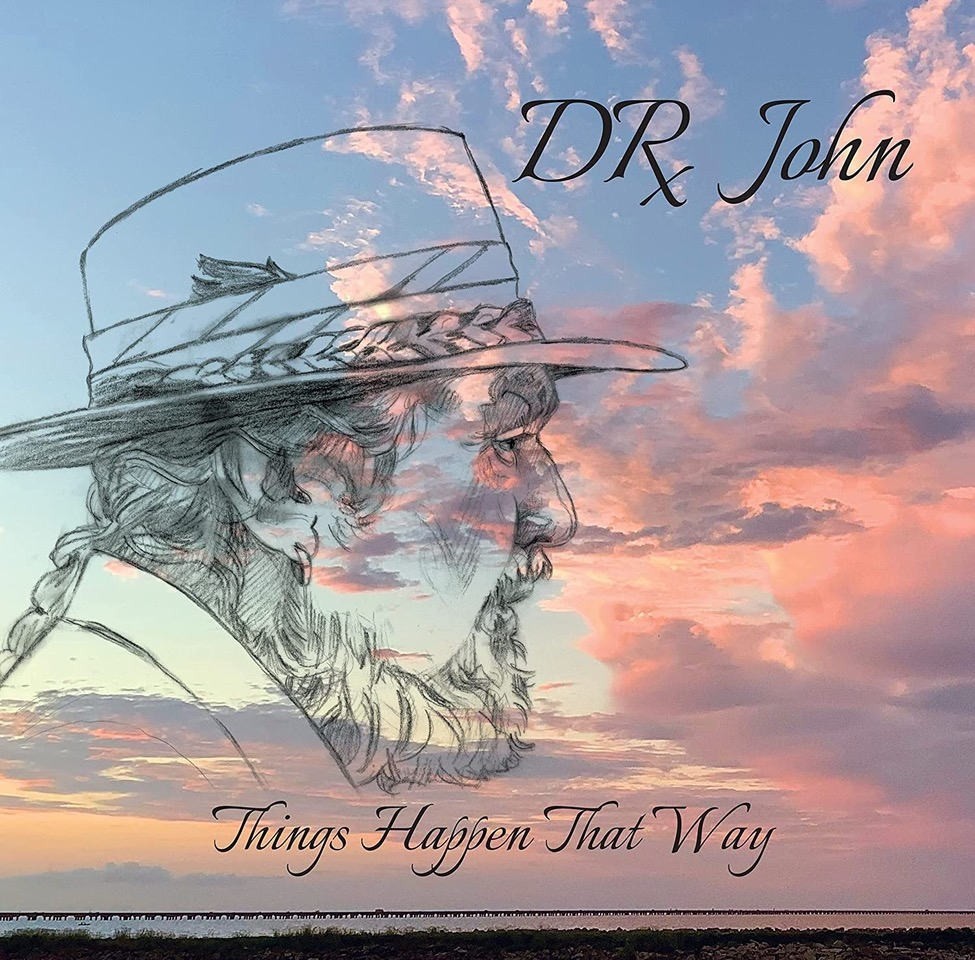
Dr. John, Things Happen That Way. The six-decade career of Mac Rebennack (aka Dr. John), which ended with his death in June of 2019, found him dabbling in everything from New Orleans–influenced R&B and jazz to rock ’n’ roll and funk. He wasn’t known for country and western, though, so the idea of him tackling numbers by the likes of Willie Nelson and Hank Williams may seem strange – until you hear what he does with them on this fine posthumous release.
On songs like Nelson’s “Funny How Time Slips Away” and Williams’s “Ramblin’ Man” and “I’m So Lonesome I Could Cry,” Dr. John’s nuanced, croaky vocals are as arresting as Leonard Cohen’s. Other treats include the traditional “Gimme That Old Time Religion,” which features a vocal assist from Nelson; a funky reading of the Travelin’ Wilburys’ “End of the Line,” with Aaron Neville sharing vocals; a version of Jack Clement’s “Guess Things Happen That Way” that’s slower and moodier than the well-known Johnny Cash cover; and three numbers that Dr. John wrote with his co-producer, Hall & Oates band leader Shane Theriot.
New Riders of the Purple Sage, Lyceum ’72. This isn’t the first or even the second New Riders album to spotlight the group’s 1972 concert material. There’s also Thanksgiving in New York City , which appeared in 2019, and Field Trip, which came out in 2020. Lyceum ‘72 may be the best of the lot, though. It preserves a high-spirited London show from May 26, 1972, the last night of the Grateful Dead’s 1972 European tour, for which the New Riders served as the opening act. (The Dead’s own great performance from that night showed up on disc only a few months ago.)
The well-recorded 78-minute set, which features Buddy Cage on steel guitar and Spencer Dryden on drums, offers five tunes from the New Riders’ eponymous 1971 debut and all but three of the 11 songs from Powerglide, the group’s then-new sophomore release. Also featured are five other numbers, including covers of the Rolling Stones’ “Connection” and “Honky Tonk Women.”
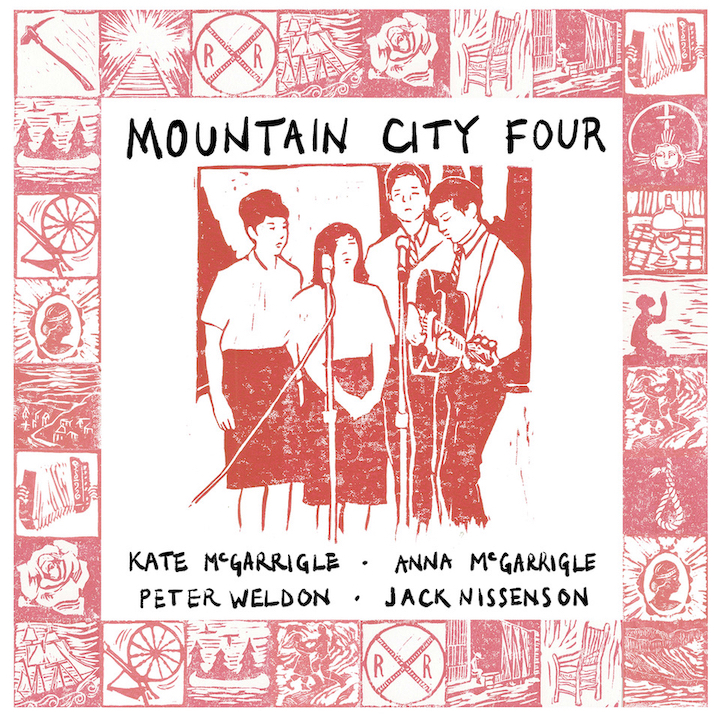
Mountain City Four, Mountain City Four. Before achieving success on their own, Anna McGarrigle and her late sister Kate were half of a traditional Montreal-based folk group called Mountain City Four, which also featured Canadian musicians Jack Nissenson and Peter Weldon. This collection of previously unreleased acoustic material includes a dozen concert tracks from 1963 and 1964, plus a pair of studio recordings from 1969 and 1970 and one number from a 2012 reunion concert that featured Nissenson, Weldon, and a bunch of their musical friends, including the McGarrigles’ sister, Jane, and Anna’s daughter, Lily.
The program finds the group breathing new life into old music with consistently exciting layered vocal work on such standards as A.P. Carter’s “Will the Circle Be Unbroken,” Bill Monroe’s “Blue Moon of Kentucky,” Sister Rosetta Tharpe’s “This Train,” and the traditional “Shenandoah.” “We sang for the love of it,” recalls Anna McGarrigle in this album’s new liner notes, and you can hear that love in these performances.
Jeff Burger’s website, byjeffburger.com, contains five decades’ worth of music reviews, interviews, and commentary. His books include Dylan on Dylan: Interviews and Encounters, Lennon on Lennon: Conversations with John Lennon, Leonard Cohen on Leonard Cohen: Interviews and Encounters, and Springsteen on Springsteen: Interviews, Speeches, and Encounters.


